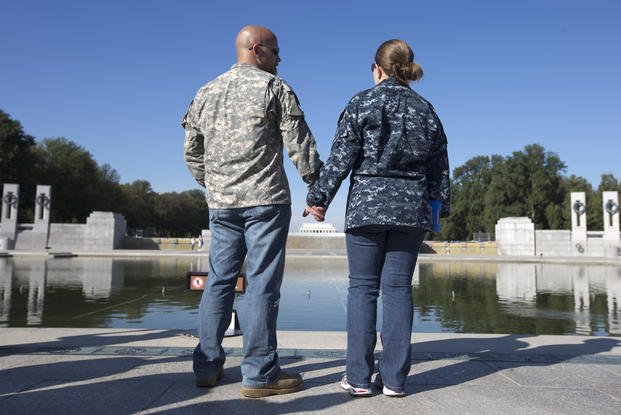Jennifer Barnhill is a columnist for Military.com writing about military families.
"A lot of us have given up careers … became the default parent," Michael Franklin, podcast host, Air Force spouse, and stay-at-home dad told me recently.
"The feeling from the DoD is still that it is a male-centric workforce so we just need to get all the resources to the female spouses," he added, describing how male spouses have quietly observed a lack of support. "The difference is men are less likely to actually come out and say that it's a problem. We're a lot more likely to sit back and say we'll figure it out."
As of 2022, 9.7% of all military spouses are male. There's sizable variation based on branch of service: Just 3.8% of Marine Corps spouses identified as male, compared to a high of 13.8% in the Air Force.
Those roughly 10% face unique challenges, according to research by the Defense Department and Blue Star Families. Male spouses die by suicide at higher rates than female spouses, and female service members married to male civilians have the highest divorce rates in the military.
According to the DoD's Annual Report on Suicide in the Military CY2022, "Male spouses accounted for about 48% of spouse suicides but made up about 14% of all military spouses across the DoD."
Male spouses in the community describe a kind of isolation that comes with being in a group some outsiders don't expect to exist. Instead, what was once a demographic anomaly, a byproduct of a male-dominated military, has become increasingly likely as women have taken on more roles in uniform and "Don't Ask, Don't Tell" fades into history.
"I can count on one hand the number of times people either in her unit, her squadron or chain of command, or anybody has called to check on me. And she's deployed three times. And two of those times were back-to-back deployments," said Franklin. "We go through all the same struggles that other spouses go through. It just seems like we're kind of expected to figure it out."
If the military is a "boy's club," then the military spouse community is at risk of being considered a "girls' club." Despite intentional efforts to combat these gendered traditions, replacing the term "wife" with the more inclusive "spouse," male military spouses may still feel like outsiders.
Nearly every male spouse I interviewed has heard the phrase "Hey, ladies!" from a spouse group member or senior military leader. While they acknowledge males are not the majority, this accidental greeting sends a message about who belongs to these groups. Rather than forcing a fit, some male spouses have formed their own communities like Macho Spouse, Manpendent and Dependabros. However, because these groups are not widespread, it may be hard for male spouses to find them.
Despite reporting similar first impressions of these groups, the dozen men I interviewed were diverse. Some were half of a dual-military couple. Some were civilian males married to female service members or civilian males in a same-sex marriage. Some were veterans, some came from military families, and others had no military connection at all. All the male spouses I spoke to did one of two things: They observed subtle messages that told them they didn't belong and pushed through, or they didn't attempt to join military spouse communities in the first place.
"There's a hesitancy to be included and be involved just because 90% of the other spouses are female," said Chris Brennan, a Marine reservist whose wife is still serving on active duty. "I've found that the exclusion factor comes from the fact that their spouses, husbands or significant others aren't comfortable with this singular male being involved or, you know, being included in activities."
Brennan and others reported receiving welcoming messages from military spouses. But despite these efforts, this potential pool of friends and support still feels closed off to male spouses, oftentimes because they don't fit the gendered expectations we have of friendship.
According to research conducted by the Survey Center on American Life, 75% of single men and 65% of single women have a friend of the opposite sex. Those numbers drop to 54% and 43% respectively for those who are married.
In a community in which rumors of cheating can swirl around the fishbowl in no time, the addition of males to the pool of female spouses may come with tension.
Sometimes, the assumption that spouses are female leads to outright blockades, making even those complicated dynamics irrelevant. Jerad Knight, an Army veteran whose husband is serving in the Navy, described trying to join a Facebook group for spouses.
"I got denied three times because I was a guy," he said. "The feedback I got was, this is a group for spouses, not for service members."
After his third denial, he sent the group administrators a message letting them know that he believed he should be admitted because not only was he a spouse, he had been voted the 2023 military spouse of the year for that duty station. Knight was not the only one; nearly half of the dozen male spouses I interviewed mentioned attempting to join Facebook groups only to be denied.
Many of those spouses previously served themselves, as dual-military marriages are quite common. According to the DoD, 14.3% of the active-duty force who are married are in a dual-military marriage. And when we look at the marriage rates by gender, the number jumps significantly with 45.3% of married active-duty females being married to another service member, compared to just 8.5% of male service members who are also in a dual-military marriage.
For some dual-military couples, the decision to step back from active-duty service while a spouse continues on is a practical one.
"I decided to start my transition to retirement because I saw that she was progressing ahead of me," said Jeremy Wilson, Army veteran and spouse. "It takes some getting used to."
Like other dual-military couples I spoke to, the Wilson family had to approach their marriage and military life strategically. Wilson believes their shared understanding of the military lifestyle has been an asset to him in his new supportive role as a military spouse.
For those male spouses who also continue to serve, sorting out family responsibilities like child care while in a dual-military couple can be a challenge. In dual-military marriages, both jobs come first to the DoD, and couples may be forced to make some tough decisions. Some turn to family for support or use their dual incomes to pay for care, if they can find and afford it.
While those dual-military couples have joint experience with service, civilian spouses may have to overcome additional challenges.
Civilian males married to female service members may feel out of their comfort zone when they suddenly find themselves as a secondary breadwinner or primary parent. According to research put out by Rand Corp., "Husbands of military women may also, as a direct result of their spouse's gender, experience stressful circumstances outside the marriage, such as discrimination and social isolation, that erode their satisfaction with the relationship."
These dynamics may contribute to divorce as the same study found that female service members married to civilian males are at a significantly higher risk of divorce than male service members married to civilian females. Enlisted females are at the highest risk, as "7.3 percent of initially married enlisted women dissolved their marriages, compared with 2.8 percent of enlisted men, 3.6 percent of female officers, and 1.5 percent of male officers." While we don't know how many of these females are married to males, Rand estimates that over 80% are.
There are some areas where male spouses are doing better than their female counterparts, though the differences reflect broader gender disparities in American society. They find work faster, are more likely to be employed, make more money when employed, and overall cite higher military lifestyle satisfaction rates than females.
It is hard to say how male military spouses are doing because so few people are asking and even fewer male spouses are part of the conversation. But as the military continues to struggle to recruit and retain female service members while talking about providing support for military families, the DoD might need to stop and take a look at the experiences of male military spouses.













